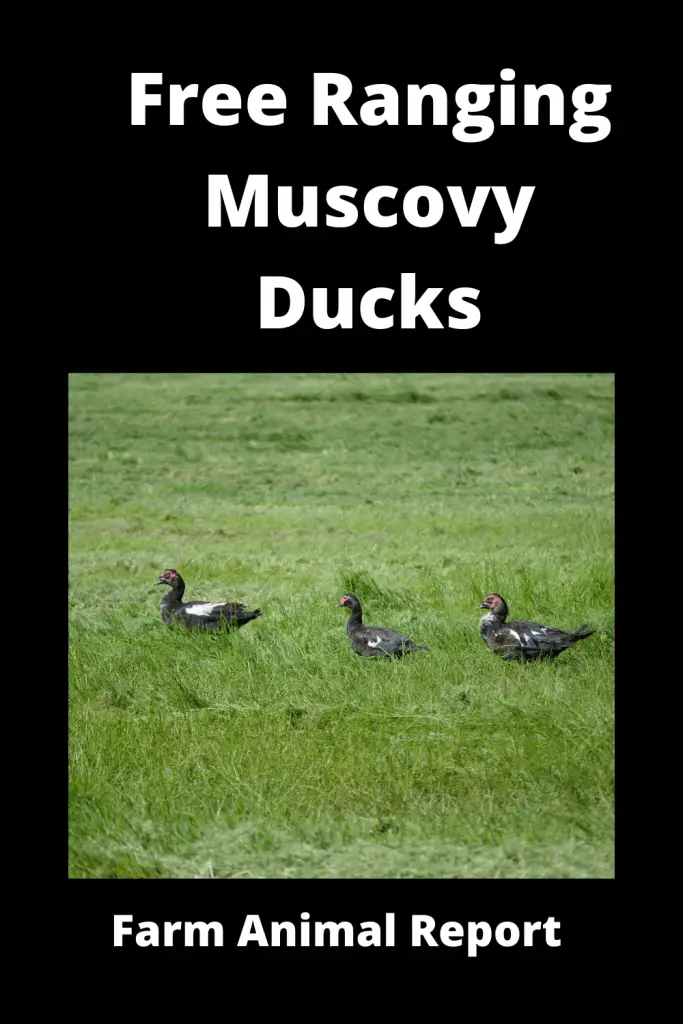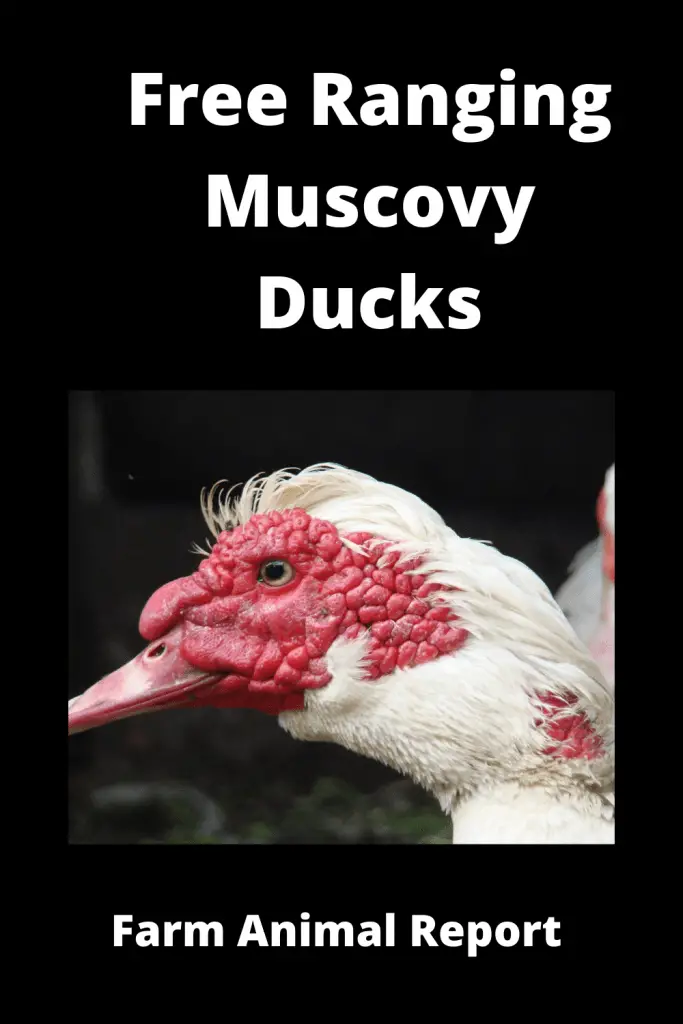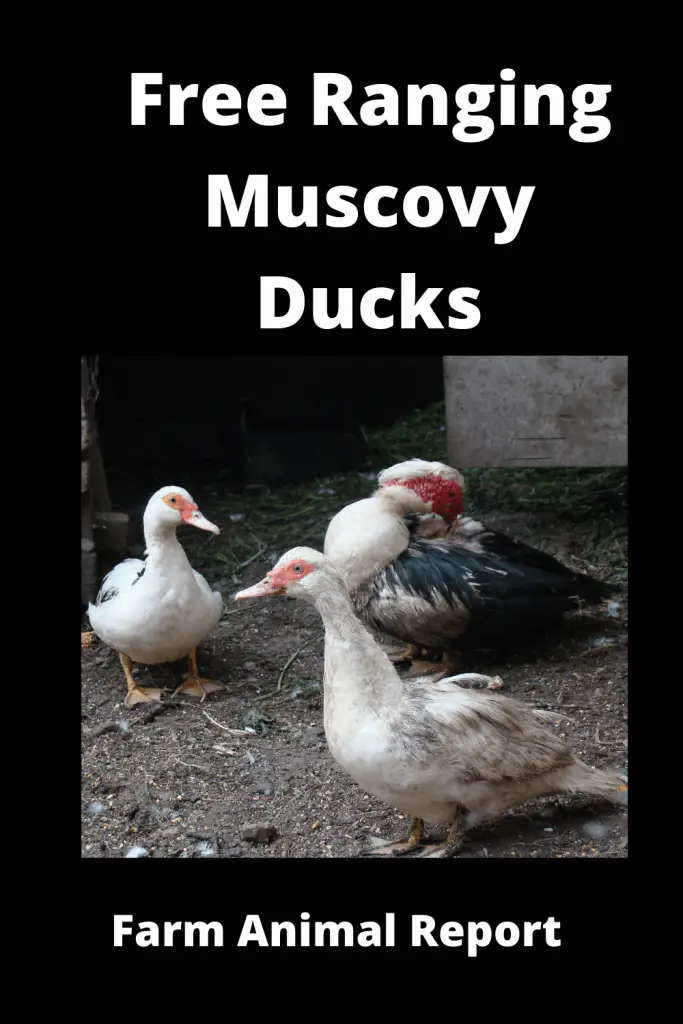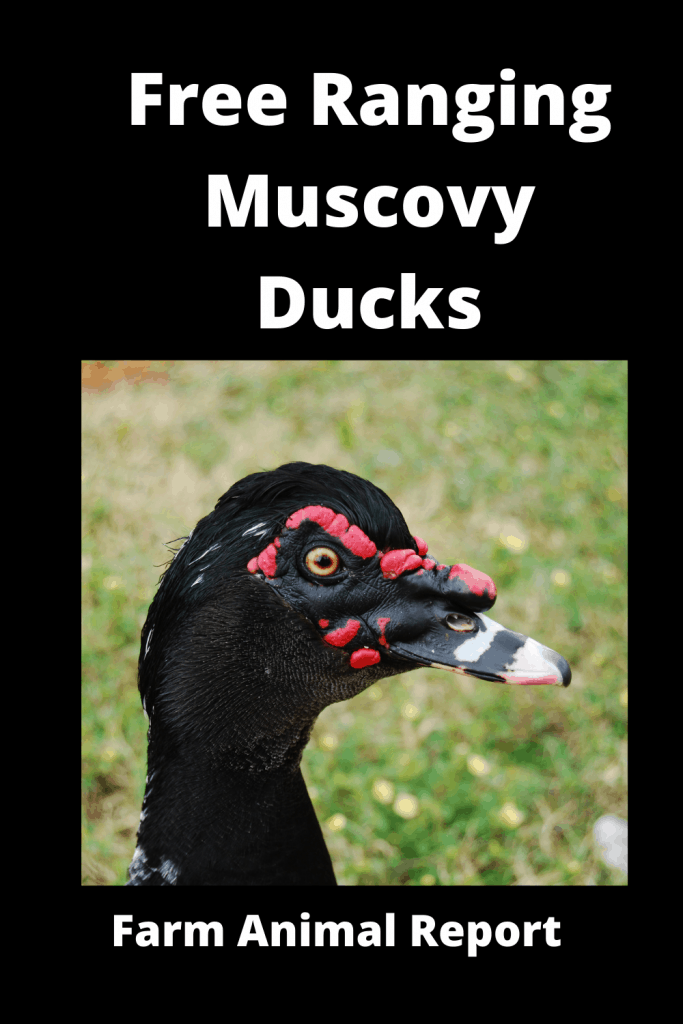Ironmen of Domestic Ducks
Free Ranging Muscovy Ducks. Originating in the warm climates of South America, the Muscovy duck is a breed apart from the rest. It is by far the leanest domesticated duck breed. The Muscovy Duck has been domesticated for centuries, and is widely traded as a “Barbary duck”. Muscovy breeds are popular because they have stronger tasting meat, sometimes compared to roasted beef.
They’re easy to identify by the caruncle on their faces, particularly the males and show birds. They come in shades of black, chocolate, blue, white, and pied. Most have white bars on their wings. Birds will frequently gain whiter as they get older.
They’re big birds with hard feathers that they molt twice a year. Adult males can weigh in at 15 pounds. The females are significantly smaller, closer to six or seven pounds as adults.
The meat is considered a delicacy and commands a high price in restaurants while the eggs are excellent for baking.
The Muscovy is a wood duck. They like to perch in trees and have sharp claws to assist with this. While they can be kept with minimal water and don’t require a pond the way other ducks do, they really enjoy it when they’re given the opportunity.

They’re not prone to frostbite. They will weather most storms outside, but appreciate shelter when weather is severe. They will happily swim year-round if there is open water available.
Free Ranging Muscovy Ducks / Behavior of Muscovy Ducks
Muscovy’s are social birds that love company of another Muscovy’s. A single drake and three to four ducks make for a happy little flock. Having multiple drakes can be a problem unless there are a lot of females to go around. Adding new birds is far less stressful than adding new chickens to a flock. These are not birds that want to cuddle with people.
While they don’t warrant their reputation as ‘mean’ birds, they’re not good for people that want to pet their birds. A Muscovy that’s raised around people will be very interested in the people around them. They don’t like to be touched and definitely don’t like to be picked up, but they tolerate handling well.

They just really
prefer not to be picked up and are powerful enough to make you regret the decision.
The claws are sharp and the wings are strong. They’re curious, social birds that will happily run up to their keeper for a chat and a treat.
They can be taught to hop into a pen at night to be kept safe from predators, but the pen needs to be quite inviting. They prefer to roost up high most nights and will need that option or you’ll have a fight on your hands.
The Muscovy carries the reputation of being mean. Some of this appears to be misinterpretation, particularly of the males. The males communicate with head bobs, posture, raising and lowering the crest on their head, and vocalizations. All of this behavior is non-aggressive.
A male trotting up to you, holding his beak open, bobbing his head, and sounding like he’s laughing and hissing is excited to see you. The wagging tail is usually a dead giveaway to the mood.
An angry Muscovy is typically not wagging his tail. The body language of threat is spread wings, lowered head, and stalking forward. A mother with ducklings can be territorial, but they’re generally accepting of a trusted keeper checking on them and refilling the feed pan. Just don’t try to touch the babies.
Speaking with other keepers, drakes get a bad rep. They’re generally laid back so long as you’re not a threat. It does help to get your birds from someone that has socialized them. Talk to them, toss them cracked corn, and give them some time to get used to you. Before you know it, you’ll be dodging as your flock comes flying in to meet you in the morning, too.

Housing and Care for Muscovy Ducks
Muscovy’s do not handle confinement well. They are powerful, active birds that need room to swim, fly, and forage for dinner. Do not plan on having a flock of Muscovy’s in a coop or small pen.
They take a good bit of space to exercise. They cause less harm to plants than chickens and provide excellent bug control.
If roaming is a big issue or you want to keep them off your roof, you can clip their wings. You’ll have to do it twice a year.
The shelter can be more primitive than what you give a chicken. Muscovy’s should have a duck hut for bad weather. It can be a 4′ x 8′ structure that’s about 3′ tall, having an opening for the door, and is attached to an 8′ x 8′ x 8′ pen with roosting branches.
In severe storms and blizzards will send the whole flock into the hut. The hut should have straw on the bottom, deep in the winter for warmth. The walls can be of plain plywood and there should be gaps under the roof for ventilation. It should be primarily a wind block and protection from snow or hail.
These ducks can be on free feed crumbles, either a mixed flock feed or the higher protein meat bird formulas are appropriate. They forage for a lot of their diet, nibbling greens and hunting bugs for large parts of the day.
Cracked corn is a very effective treat for training and meal worms are also a big hit. They will steal ripe squash from the garden on occasion, so don’t leave that out. They should be offering at least a kiddy pool for them to splash around in, since the adults need a fair amount of space in order to bathe. Bathing is a boisterous, noisy affair with water flying everywhere and if they have nothing but their water supply, you’ll be refilling it frequently.
Breeding Muscovy Ducks
Drakes can get roudy in the spring, so make sure there are enough ducks to avoid him being overly amorous with any one female. A quad works well (1 male, 3 females) but if you see signs of females being roughed up you may need to expand.
The females like to hide their nests away, so provide them shelters or accept that some will disappear to brood and you’ll never find their nests. A large Tupperware with a cut out for a door works well. Like just about everything with these ducks, they handle everything for themselves.
The ducklings are storming around within a day of hatching, swimming and hunting bugs with mom. Make sure there is access to water they can reach (they’re good jumpers, bricks as steps works just fine) and a pan of crumbles, mom will handle the rest. let them free range during the day. Mom handles hunting and swimming lessons.

Advantages of Muscovy Ducks
They are Quack-less
Muscovy ducks have no voice. Compared to other ducks and geese, these birds are extremely quiet. They also like a snakes, and this can be highly advantageous if you have neighbors who aren’t fond of loud quacking, don’t like the quacking yourself, or are trying to find a bird that can exist undetected in your backyard.
Muscovy ducks are great mothers
Muscovies are expert mothers. You can almost guarantee that the female you have will be broody when the right time comes. These ducks can clutch out upwards of 30 eggs at a time 2-3 times a year, with a high success rate.
Their increased size helps them to be able to keep so many warm at a time.
Muscovy mothers will also gladly parent other poultry birds if hatched out in the same clutch. These birds are also tougher than the average domesticated bird, which gives them confidence to guard such large clutches.
Muscovies have been known to scare off larger mammals such as raccoons, skunks, and, in rare occasions, a coyote. Muscovies don’t disappoint when it comes to motherhood.
These ducks are super hardy
Muscovies are like the ironmen of domestic ducks. They are kept successfully from high up in Alaska to Central America, which is where they are native to. I will again contribute some of this to their larger size, but I also think their higher appetite contributes to being able to produce more heat when needed.
In general, most domestic ducks are pretty good with colder winter spells. However, they may slow down their laying rate at temperatures below -7 C. Being from a warmer tropical climate, these birds can handle upwards of high 30s for daytime temperatures as long as there is ample access to drinking water.
This makes them extremely useful for cleaning up finished greenhouses and hoop gardens.
Muscovy ducks are great foragers
Sometimes it feels like Muscovy ducks will eat anything. They have an insatiable appetite for slugs, bugs and plants. I have even seen them hunt flying mosquitoes, sticking their heads down in the hunting position as they flick their neck back and forth at anything flying by. They are great for cleaning up creeks, keeping grass down, and even reducing the mice population.
Muscovies eat mice
Yes, this deserves its own point. Muscovies eat mice.
They have instincts to chase down small critters because their native diet consists of the usual duck food as well as small rodents, lizards, snakes and other small terrestrial critters.
This makes them great hunters. Don’t like cats on the farm? Get some of these birds to clean up your mice problem.
They make excellent guard birds
A full-grown male Muscovy can weigh up to 15 kg and with a large back claw (used for perching), which can be used as an effective eyeball clawer. This bird is a force to be reckoned with.
A mother Muscovy might make some animals think twice about attacking, but a full-grown angry male Muscovy coming in at twice the size is usually not worth the hassle when it comes to an easy meal for wildlife. Having at least one large male as a guard duck can help with flock safety.
Muscovies have lean meat
These birds have very little fat when it comes to meat. This bird generally isn’t as practical for meat if you look at feed per weight but if you are looking for super lean meat these birds are the birds for you.
Muscovy ducks can utilize vertical space in a coop, instead of ground space
Muscovy ducks prefer to perch! They have a back claw that is used to grip onto branches, which can sometimes get in the way when trying to pick up one of these birds. But! This means you can use vertical space and that old chicken coop that’s been sitting out in the field can get re-purposed. Everyone seems to be looking at ways to utilize vertical space and Muscovies know how it’s done.
Can be crossed with domestic ducks to make sterile offspring
Muscovies can be crossed with most domestic ducks, which are usually mallard derived, to produce mostly sterile offspring. This is usually done to create meat birds with better growth rates and leaner meat than normal domesticated ducks. There is also the advantage of not having to worry about cross breeding or inbreeding when kept with parent ducks.
So many different color varieties
Disadvantages of Muscovy Ducks
They are not good for egg production
Compared to other laying duck breeds, Muscovy’s lay so few eggs they’re not even worth mentioning as a laying option. They lay a dismally low 100-180 eggs per year under ideal laying conditions (which includes proper lighting, facilities, routine, and happy ducks).
Khaki Campbell, buff, white layers, and many other layer breeds will lay well over 250 eggs each year. The only good thing about Muscovy’s as layers is that their eggs are larger than the average duck eggs, possibly because the Muscovy itself can be quite a bit larger than the size of the average laying duck. Regardless, when you take into consideration how much feed it takes to get each egg it is impossible to call these birds good layers.
Muscovy’s are not effective as meat birds
Muscovy’s grow really, really slowly when compared to the average meat or even laying duck, although some prefer the distinct quality of their meat. Most meat ducks, such as Peking, will grow to a harvestable weight in 7 Weeks. Harvestable weight for a Muscovy is usually around 20 weeks. And that’s not taking into consideration the voracious appetites of Muscovies, which brings me to the next point.
Muscovy ducks have ridiculous appetites
To put it simply, Muscovies eat too much. They seem to eat constantly and vastly out eat any other duck breed I have owned. This makes the few eggs they lay even more food intensive. It also means having to spend much more on food while growing ducklings to butcher weight.
One of a Muscovies favorite meals is actually mosquitoes and their larva. Full grown Muscovies have also been known to eat mice they catch. Now eating mice and mosquitoes sounds like the best thing ever, which I agree with! But they still eat far too much grain feed to qualify them as practical for meat or eggs. Plus, they are much more destructive on the garden if they get out.
Muscovies can fly
Muscovies are very close to being a wild birds breed. As a result, they have many natural instincts and survivable traits, including being able to fly. Most domestic ducks have been bred to be unable to sustain flight for any period of time, but many Muscovies still have the ability to do so.
Flying may also cause a problem when trying to pen your poultry in fenced areas. You can prevent their ability to fly effectively by trimming one wing (this discourages them from flying by throwing off the balance of feathers).
These birds have an extra claw
Muscovy ducks have one wicked claw on the hind of their foot, and it can get super sharp. Muscovies are actually perching birds and prefer to roost on a stick or log as they sleep at night.
This extra big claw helps them grip a roosting site that most ducks would normally not consider. Their claws on the tips of their fore feet are also larger than the average duck. When an unsuspecting homesteader is attempting to pick up a Muscovy for transport, wing maintenance, or any other reason, they are likely to sustain some minor damage from scratching.
This makes duck interactions less fun. Dealing with Muscovies is definitely not a task I would send my kids to do.
Muscovies are HUGE
An adult male Muscovy can Weight 7 kg (15 lbs.)! The females are half that size fully grown. The average size of my white layers is 2-2.7 kg (4-6 lbs.). The popular laying breed khaki Campbell weighs 0.9-2.2 kg (3-5 lbs.). Having such a large breed makes keeping a drake on the farm a real commitment. They take more space, are tougher on the ladies, and eat a lot more food.
World Duck Breeder Associations
| Duck Association | Location | Link |
|---|---|---|
| NSW Waterfowl Breeders Association | Australia | NSW |
| Rare Breeds Poultry | Australia | Rare Breeds Poultry |
| International Waterfowl Association | Minnesota | IWBA |
| National Call Breeders of America | Ohio | NCBA |
| Breeders Associations | Belgium Canada South Africa UK | BelgiumSouth AfricaCanadaUK |


